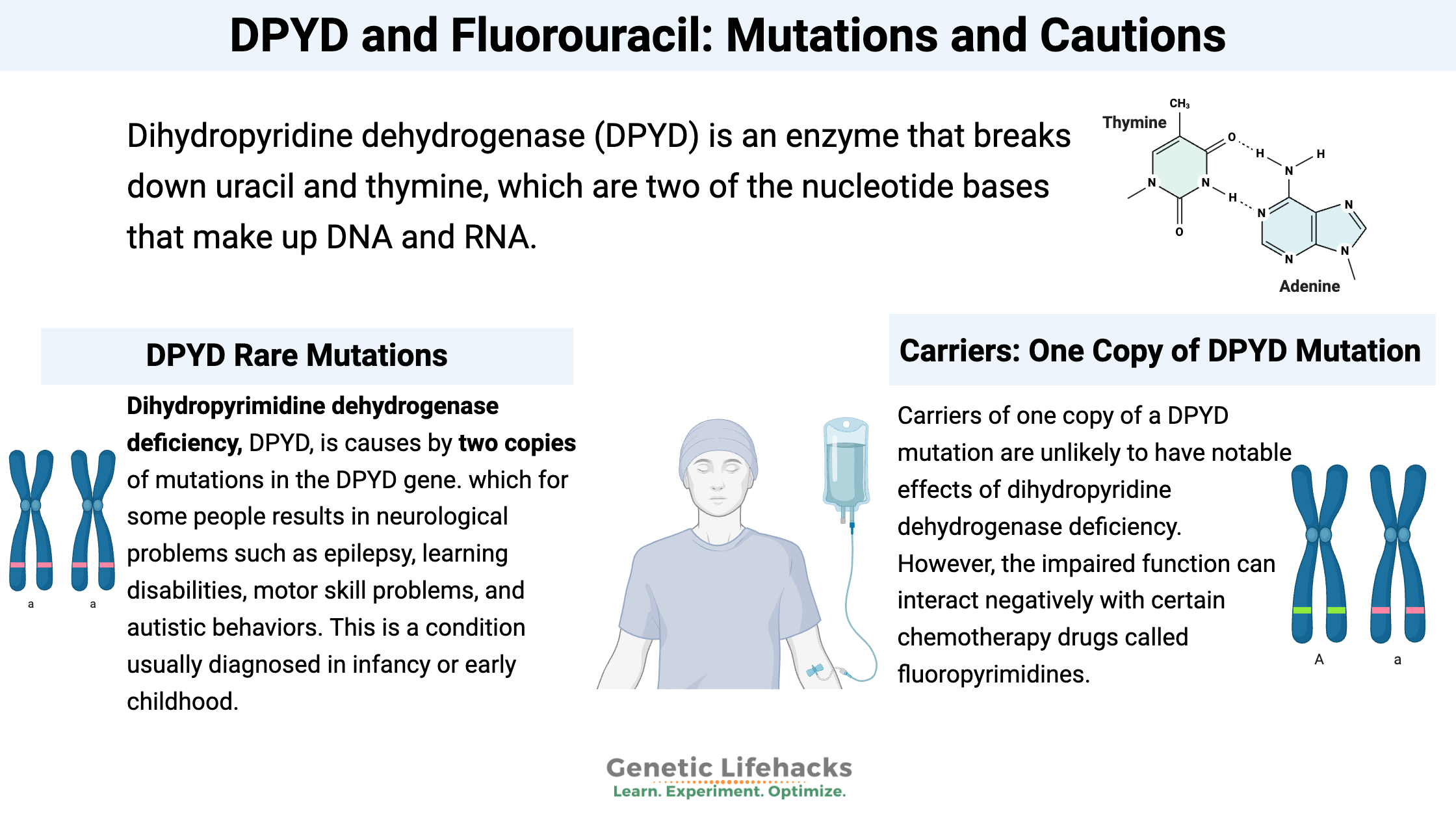Key takeaways:
~ Dihydropyrimidine dehydrogenase is an enzyme that breaks down uracil and thymine, which are two of the nucleotide base pairs that make up DNA and RNA. Essentially, the enzyme keeps the proper balance of the nucleotides in the cells.
~ Mutations in the DPYD gene impact 5-fluorouracil metabolism, which is a type of chemotherapy used for certain cancers.
~ Knowing your genetics here can give you the “heads up” to talk with your doctor about DPYD variants before cancer treatment.
Dihydropyrimidine dehydrogenase (DPYD):
Dihydropyrimidine dehydrogenase (DPYD) is an enzyme that breaks down thymine and uracil, which are two of the nucleotide base pairs that make up DNA and RNA. Thymine and uracil are classified as pyrimidines, and dihydropyrimidine dehydrogenase is the enzyme causing the catabolism or breakdown of pyrimidines.
The DPYD enzyme keeps the proper balance of the nucleotides in the cells. A deficiency in the DPYD enzyme can result in a build-up of uracil and thymine.
Specifically, dihydropyrimidine dehydrogenase converts uracil (found in RNA) to dihydrouracil, but this process also affects thymine (found in DNA) levels.

DPYD Deficiency:
Multiple mutations have been discovered in the DPYD gene that affect its function.
Having two mutations in the DPYD gene can cause a severe dihydropyrimidine dehydrogenase deficiency, with some people having very little enzyme activity.
There’s a wide range of symptoms presented from severe DPYD deficiency (two copies of the DPYD mutations).[ref]
- On one end of the spectrum, DPYD mutations are associated with delayed development, epilepsy, learning disability, growth retardations, and autism.
- On the other end of the spectrum, some have little to no symptoms. Many people are unaware that they have DPYD deficiency.
DPYD and pyrimidine metabolism also play a role in keeping the liver lipids at a healthy level. Recent research shows that fatty liver disease is associated with high pyrimidine levels.[ref]
5-fluorouracil and cancer:
A commonly used chemotherapy treatment, 5-fluorouracil (5-FU), interacts with DPYD deficiency.
5-fluorouracil is used for rapidly growing cancers, such as colon cancer. 5-FU is partially metabolized by DPYD in the liver. The non-metabolized part can limit the availability of pyrimidines for DNA synthesis and end up causing uracil incorporation into DNA, which results in double-stranded breaks and cell death.
It’s a fine balance of 5-FU being able to cause fast-growing cancer cells to die, vs too much 5-FU being toxic to healthy organs. Thus, the activity of the DPYD enzyme needs to be understood before the 5-FU treatment and dosing begins.[ref][ref]
Heterozygous (1 copy) mutations in DPYD:
While you are unlikely to have notable effects of dihydropyrimidine dehydrogenase deficiency from having one copy of a DPYD mutation, the impaired function can interact negatively with certain chemotherapy drugs called fluoropyrimidines. Fluoropyrimidines are widely used as chemotherapies for solid tumors. The reduced ability to break down uracil causes a buildup of these types of drugs, including 5-fluorouracil (5-FU), capecitabine, or tegafur. This increases the toxicity of the chemo drugs, leading to increased toxicity. [ref]
Here is an explanation from the Genetics Home Reference.
“People with dihydropyrimidine dehydrogenase deficiency, including those who otherwise exhibit no symptoms, are vulnerable to severe, potentially life-threatening toxic reactions to certain drugs called fluoropyrimidines that are used to treat cancer. Common examples of these drugs are 5-fluorouracil and capecitabine. These drugs are not broken down efficiently by people with dihydropyrimidine dehydrogenase deficiency and build up to toxic levels in the body (fluoropyrimidine toxicity).”
Other drug interactions with DPYD mutations:
One specific antifungal medication, flucytosine, is also partially deaminated to 5-FU and may cause toxicity in people with DPYD deficiency.[ref] Flucytosine is used to treat severe Candida or Cryptococcus infections. [ref]
Genotype report: DPYD gene
Please keep in mind that 23andMe and AncestryDNA data are not guaranteed to be clinically accurate, so there is a chance of a false positive or false negative. There are additional, rare DPYD mutations and copy number variants that aren’t covered in 23andMe/AncestryDNA data.
Access this content:
An active subscription is required to access this content.
Lifehacks:
If you have a mutation in the DPYD gene, take this information as a ‘heads up’ to talk with your doctor about it if you are ever diagnosed with cancer. Additionally, it is something to mention to your children, siblings, or parents if they are facing chemotherapy choices. They may need to be tested for the mutation, also.
Uracil from foods:
Uracil is found in RNA, which we get at low levels when we eat foods. Organ meats and mushrooms are particularly high in RNA, and muscle meats also contain quite a bit of uracil. In the gastrointestinal tract, RNA in foods is broken down into its components, including uracil.
A study looking at uracil levels in the body after food intake found that both the time of day and the intake of food affected the levels. Eating a meal in the morning high in uracil actually caused the uracil levels in the body to drop by midday in people with normal uracil metabolism.[ref]
Luteolin:
Research shows that luteolin, a flavonoid that acts as an antioxidant, can reduce the expression of DPYD. The research on this was in the context of pancreatic cancer, where overexpression of DPYD is thought to increase the invasiveness of the cancer.[ref] If you have DPYD variants and are undergoing cancer treatment, be sure to talk with your doctor before taking luteolin.
Recap of your genes:
Access this content:
An active subscription is required to access this content.
Related articles and topics:
Antibiotics: Exploring the Interplay of Genetics and Antibiotic Reactions

